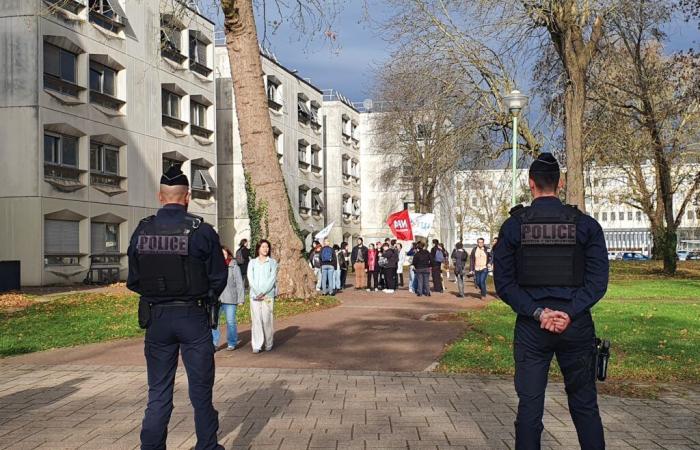It's an almost ordinary day, this Monday, November 25, 2024. Students come and go on the Saulcy campus in Metz as if nothing had happened. Except for the billboards which, one after the other, display a similar anti-government message.
The arrival of Patrick Hetzel, Minister of Higher Education, Research and Innovation, has been known since Friday November 22 and the students had time to prepare a welcoming committee for him. “Hetzel get out of it, college isn’t yours” or “Deprivation. Hetzel’s university, we don’t want it”, the tags follow one another and look the same. Then they give way to songs. A small mobilization of students can be heard a few meters from the university residences.
This is where the minister was dropped off. He is in one of them surrounded by state services, elected officials from the territory (mayor François Grosdidier, deputy Belkhir Belhaddad, senator Khalifé Khalifé among others), and members of the University of Lorraine as well as Dominique Peljak, director of the CHR Metz-Thionville. He smiles, exchanges knowing glances, looks good in his sneakers despite the demands that continue outside.
Frédéric Léonard, general director of Crous Lorraine, says a few words and here are all these little people on their way for a tour of the buildings. We naturally talk about comfort, architecture, reception capacity and even future construction. Thus, we learn that a P8 (eighth building) will see the light of day in 2025 with 130 housing units of 16 m2 which will be accessible for the start of the 2026 school year, increasing the accommodation offer to 1,054.
A student catering assistance card
Then, head to the university restaurant for the main course: the expected speech from the minister. He first praises the quality of the reception of students on the Saulcy site, confident that the improvement of student life must be based on “the triptych: housing, food and social assistance”.
Then he talks about figures, recalling that between September 2023 and September 2024, “43 million meals were served and more than 500,000 students benefited from 1 euro meals”. However, these measures remain imperfect since they do not affect everyone.
“Approximately 100,000 students do not have a local catering solution [à moins de vingt minutes] at a moderate price,” he slips. And it is them that the State wants to target with the launch of a student catering assistance card from February 2025. It will vary between 20 euros (non-scholarship holder) and 40 euros (scholarship holder) with an increase of 10 euros for overseas departments. “The publication of the decree in the Official Journal is scheduled for this week,” confides Patrick Hetzel, delighted. A measure budgeted by the State at 38 million euros for 2025 and 45 million euros for 2026.
The decree published, each rectorate will be responsible for identifying “white areas” to determine which students will be eligible for this aid. Please note that this card will be reloaded every month and can be used both in restaurants and for shopping in food stores.
“That doesn’t satisfy us at all”
Jean Daudré-Vignier, student representative.
The reception of the measure is mixed among students. “We are relatively happy to see that there is funding allocated for students but that does not satisfy us at all,” indicates Jean Daudré-Vignier, student vice-president at Crous Lorraine. And for good reason, he notes that student precariousness is increasing with an increase of “200% last year, again 200% in the coming year” in attendance at Agoraes. [épicerie solidaire ouverte aux étudiants sur critères sociaux où ils bénéficient de produits alimentaires sont à 10 % du prix du marché]. Demand is so strong that a fourth grocery store will soon see the light of day in Lorraine.


“At first glance, we have the impression that it is a good thing but on the other hand, the Levi law requires partnerships and agreements to be made so that the Crous can have catering points for students [mairie, restaurant administratif]. We would prefer it to go in this direction because it would keep the meal between 1 and 3.30 euros. There, we have no feedback on what the student will pay in the end. We're just going to give him an envelope,” explains Jean Daudré-Vignier, emphasizing the fact that if the costs remain the same, the card will give him three meals. He ends by qualifying his remarks because if the agreement appears to be the most suitable solution, it also increases “the financial burden of the Crous”. He also notes that the measure concerns more medium-sized towns such as Thionville or Forbach because the largest towns (Metz, Nancy) already have a catering establishment on the various campuses.








